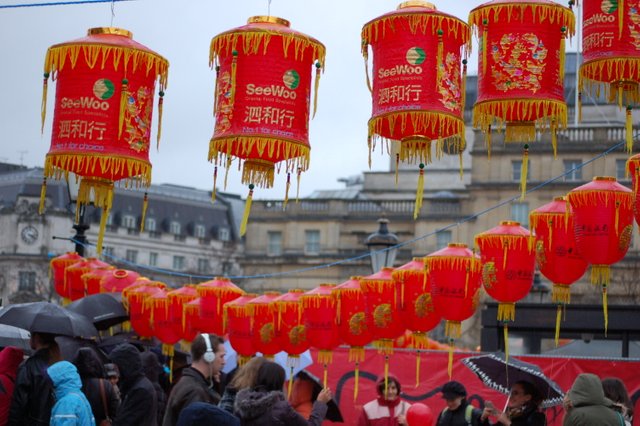It's been a long time since I've written a post about languages. Today I want to talk about English and Chinese language, specifically about idioms from a cross culture point of view.
Growing up bilingual in English and Chinese meant that often I take both languages for granted and don't think much about the differences or similarities between them. This is especially so when speaking as my mind is just thinking in one language and not both. Writing is another matter as I normally write bilingual, despite my Chinese being weaker than my English.
Since I've been blogging, often I notice how the phrases or idioms I use in the two languages are quite similar despite originating from two very different cultures. For example in English we have Silence is gold and in Chinese we have 沉默是金Chén mò shì jīn. Another example is Tip of the iceberg and 冰山一角 Bīng shān yījiǎo. The two phrases are exactly the same, so it's possible that one got translated by the other.
So I started digging a bit deeper, looking for idioms from both languages that dates back to a long time ago. And oddly enough I found some that were very similar. Both the English and Chinese language are very old, as are their culture which has evolved over the years. The countries are on the opposite sides of the world, so how is it that their idioms are very similar? Let's me show you what I mean.
The idiom Needle in a haystack is used when you are searching for something that is very difficult to find. In the old days, needles were made of bone or piece of wood and looked very similar to hay. Imagine how difficult it is to search for the needle in a haystack.
The Chinese has a similar phrase 大海撈針 Dà hǎi lāo zhēn. The word to word translation is "big sea scoop needle". The meaning is pretty obvious and the interesting thing about this phrase is that like the English version, it also searches for a needle but in the sea and not a haystack. Hay isn't something that features often in traditional Chinese agriculture society.
A drop in the bucket refers to something that is very insignificant in relation to the whole. It originates from the bible so is old, but nowadays a drop in the ocean seems to be more commonly used. It's not sure how the latter phrase came about.
Oddly enough the Chinese version is also about the ocean. 滄海一粟 Cāng hǎi yī sù. Cāng hǎi means vast sea, and yī sù is a grain. A grain is so small when compared to the sea that it is so negligible and insignificant.
Kill two birds with one stone originates from the 17th century and the Chinese equivalent 一箭雙鵰 Yī jiàn shuāng diāo much earlier around the 5th to 6th century. The word to word translation of the Chinese version is one arrow two eagle. Diāo is a type of big eagle and to kill two of these large creatures with just one arrow means achieving two results with just one action. This is very similar to the English version, one uses a stone another uses an arrow, but both manage to kill two birds at the same time.
As we all know, there are twelve in a dozen, so the saying six of one, half a dozen of the other means there is no difference between two things. The Chinese also uses counting in the same idiom 半斤八兩 bàn jīn bā liǎng. Jin is catty, the traditional weight unit that is still used in some trades today . One catty is about 600g and there are 16 liang (taels) in a catty. The translation of bàn jīn bā liǎng is half a catty eight taels.
This is just a very very small selection of the many idioms out there, I am sure if I keep searching there will be more of them. What I find fascinating is how both the English and Chinese version often uses the same subject in the idiom such as a needle, the ocean, a bird, or numbers. Why out of so many subjects, could they not have used something else or represented the meaning in another way? Perhaps culture isn't as diverse as we think, and the world is much smaller than we imagine. I'm going to leave you with one last idiom from both sides of the world.
Great Minds Think Alike
英雄所見略同 Yīng xióng suǒ jiàn lüè tóng Heroes see the same
This post is my entry to the Cross-culture Challenge by my friend @itchyfeetdonica. You can find details of the challenge in her post here. One of the rules to the challenge is to post from Partiko. I have heard great things about this app but I'm not a big fan of forced advertising so do not currently use it. I will make an exception this time to support @itchyfeetdonica as she creates great content on Steemit and I hope you will support her as well.
這個帖子是參加 @itchyfeetdonica的跨文化活動,想聊聊中英文的成語。
自從開始寫作後,一般帖子我會以雙語發。 在翻譯過程中,經常都會發現中文和英文的成語很類似。 我說的不是成語的意思,而是當中表達的方式和用的主語。 例如沉默是金,冰山一角,都是近年較常見的成語。意思跟英文一樣,可能是直接翻過來也不定。
但有一些自古已有的成語,例如大海撈針,滄海一粟,一箭雙雕或半斤八両等等, 原來跟英文的成語很相似。 中英兩方的成語從遠古已有,而中文和英文源自天各一方,兩個完全不同的文化。 究竟為什麼兩方的成語不約而同都會有針,有海,有鳥和數字呢? 莫非世界根本不是那麼大?或者中方和西方的文化差異其實比我們想像中的小?
英國和中國兩個都是歷史和文化深厚的國家, 以我的愚見,我覺得是 Great minds think alike 英雄所見略同 吧!
Posted using Partiko Android




Hi @livinguktaiwan!
Your post was upvoted by @steem-ua, new Steem dApp, using UserAuthority for algorithmic post curation!
Your UA account score is currently 4.868 which ranks you at #1264 across all Steem accounts.
Your rank has improved 7 places in the last three days (old rank 1271).
In our last Algorithmic Curation Round, consisting of 241 contributions, your post is ranked at #49.
Evaluation of your UA score:
Feel free to join our @steem-ua Discord server
Downvoting a post can decrease pending rewards and make it less visible. Common reasons:
Submit
Congratulations @livinguktaiwan! You have completed the following achievement on the Steem blockchain and have been rewarded with new badge(s) :
Click here to view your Board
If you no longer want to receive notifications, reply to this comment with the word
STOPDownvoting a post can decrease pending rewards and make it less visible. Common reasons:
Submit
Congratulations! Your post was selected by the @dropahead Curation Team (dCT)
I think that the reason for there being so many similar idioms between Chinese and English is because of the common evolutionary history that humanity shares. We are faced with more or less the same challenges everywhere, everytime :)
Thanks for sharing your thoughts, best regards.
@dropahead - Supporting your STEEM adventure
Downvoting a post can decrease pending rewards and make it less visible. Common reasons:
Submit
Quality review by the dropahead Curation Team
According to our quality standards(1), your publication has reached an score of 88%.
Well said Gabriel García Marquez: "One learns to write by writing" Keep trying, you will soon achieve excellence!
(1) @dropahead's quality standards:
- Graphic relation to the text (Choice of images according to the text)
- Order and coherence
- Style and uniqueness (Personal touch, logic, complexity, what makes it interesting and easy to understand for the reader)
- Images source and their usage license
Downvoting a post can decrease pending rewards and make it less visible. Common reasons:
Submit
Thats quite true @joelsegovia, thanks for dropping by!
Downvoting a post can decrease pending rewards and make it less visible. Common reasons:
Submit
You got a 30.84% upvote from @ocdb courtesy of @livinguktaiwan!
@ocdb is a non-profit bidbot for whitelisted Steemians, current max bid is 15 SBD and the respective amount in Steem.
Check our website https://thegoodwhales.io/ for the whitelist, queue and delegation info. Join our Discord channel for more information.
If you like what @ocd does, consider voting for ocd-witness through SteemConnect or on the Steemit Witnesses page. :)
Downvoting a post can decrease pending rewards and make it less visible. Common reasons:
Submit
Hi, @livinguktaiwan!
You just got a 1.05% upvote from SteemPlus!
To get higher upvotes, earn more SteemPlus Points (SPP). On your Steemit wallet, check your SPP balance and click on "How to earn SPP?" to find out all the ways to earn.
If you're not using SteemPlus yet, please check our last posts in here to see the many ways in which SteemPlus can improve your Steem experience on Steemit and Busy.
Downvoting a post can decrease pending rewards and make it less visible. Common reasons:
Submit
Thanks for joining the challenge and for your support! :) Very interesting comparisons. I used to teach Mandarin to foreigners and English to Chinese, so was involved in this topic a lot too. I think you are right that the world is much smaller than we imagine, and there are actually many similarities in word usages.
Downvoting a post can decrease pending rewards and make it less visible. Common reasons:
Submit
It's a bit fascinsting in that respect, don't you think so?
Downvoting a post can decrease pending rewards and make it less visible. Common reasons:
Submit
Definitely agree with you the world is more small than we imagine. I did not expect such similitude between Chinese and English language. This is one of many advantages have people who are native speaker of more than one language.
Downvoting a post can decrease pending rewards and make it less visible. Common reasons:
Submit
It's only when you start to pay attention that you discover these nuances, otherwise you just take it for granted.
Downvoting a post can decrease pending rewards and make it less visible. Common reasons:
Submit
That's also true
Downvoting a post can decrease pending rewards and make it less visible. Common reasons:
Submit
有趣
Posted using Partiko Android
Downvoting a post can decrease pending rewards and make it less visible. Common reasons:
Submit